Reflective Essay on Race, Ethnicity, Identity & Social Work Values
VerifiedAdded on 2023/04/21
|12
|3701
|428
Essay
AI Summary
This essay explores the author's personal experiences with racism, oppression, and privilege, and how these experiences have shaped their values as a social worker. It discusses the importance of understanding these issues in social work practice and provides a personal anecdote of assisting an Aboriginal man facing discrimination. The essay also delves into the author's values, including public service, social justice, dignity, understanding human relationships, and integrity, and how these values are reflected in their social work. Furthermore, the essay reflects on how social work practice has contributed to the author's personal growth, particularly in understanding different forms of oppression and privilege. It also touches upon concepts like institutional oppression, internal oppression, and the importance of addressing racism through social interactions.
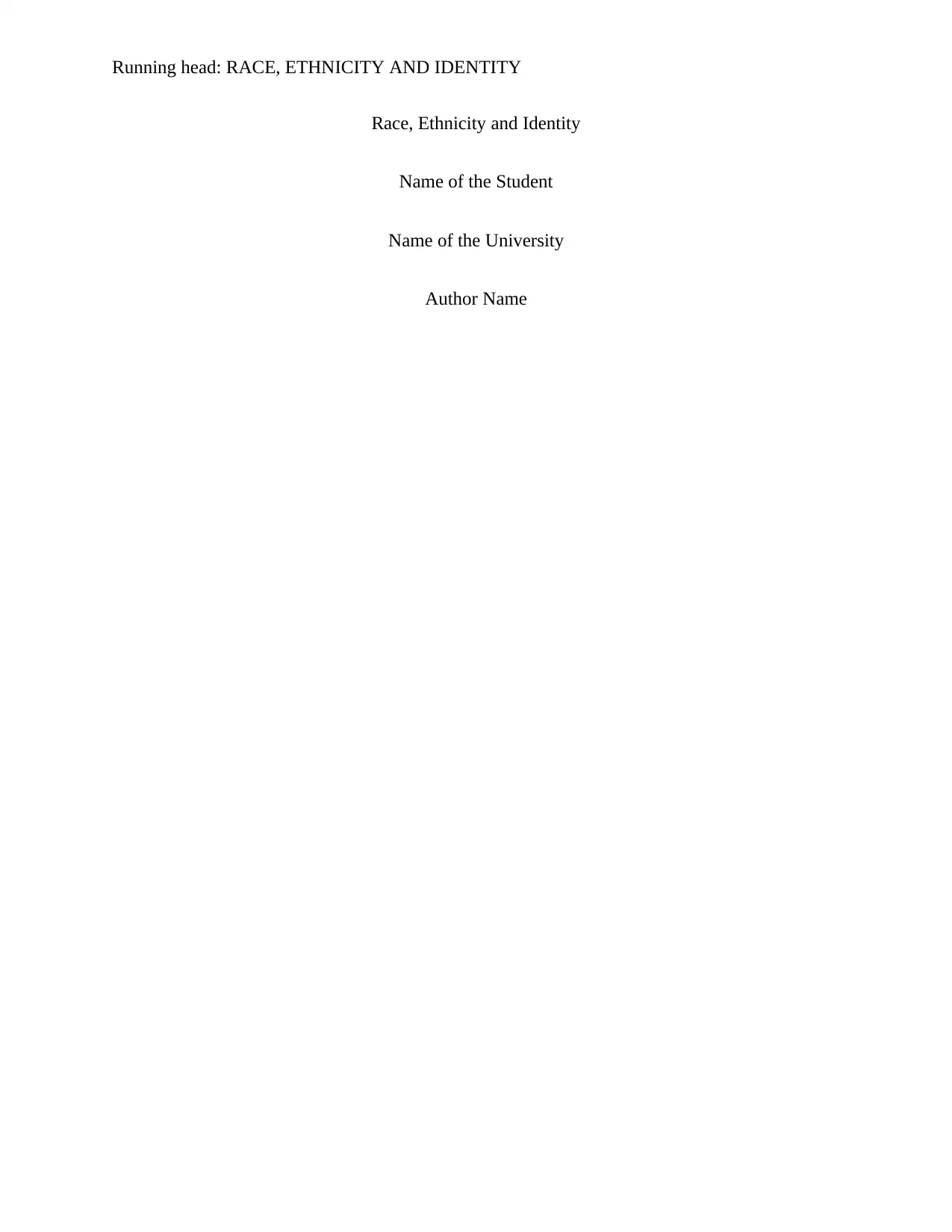
Running head: RACE, ETHNICITY AND IDENTITY
Race, Ethnicity and Identity
Name of the Student
Name of the University
Author Name
Race, Ethnicity and Identity
Name of the Student
Name of the University
Author Name
Paraphrase This Document
Need a fresh take? Get an instant paraphrase of this document with our AI Paraphraser
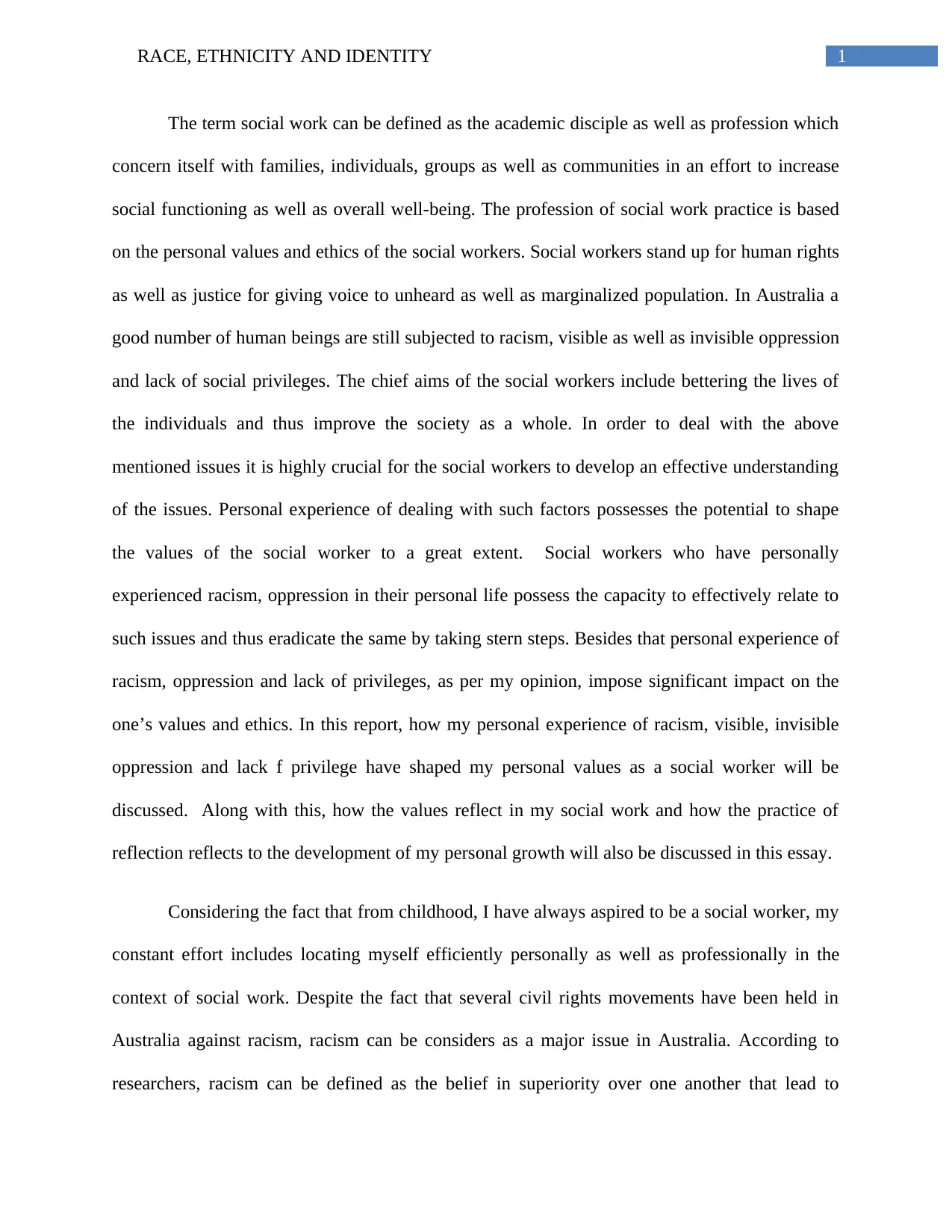
1RACE, ETHNICITY AND IDENTITY
The term social work can be defined as the academic disciple as well as profession which
concern itself with families, individuals, groups as well as communities in an effort to increase
social functioning as well as overall well-being. The profession of social work practice is based
on the personal values and ethics of the social workers. Social workers stand up for human rights
as well as justice for giving voice to unheard as well as marginalized population. In Australia a
good number of human beings are still subjected to racism, visible as well as invisible oppression
and lack of social privileges. The chief aims of the social workers include bettering the lives of
the individuals and thus improve the society as a whole. In order to deal with the above
mentioned issues it is highly crucial for the social workers to develop an effective understanding
of the issues. Personal experience of dealing with such factors possesses the potential to shape
the values of the social worker to a great extent. Social workers who have personally
experienced racism, oppression in their personal life possess the capacity to effectively relate to
such issues and thus eradicate the same by taking stern steps. Besides that personal experience of
racism, oppression and lack of privileges, as per my opinion, impose significant impact on the
one’s values and ethics. In this report, how my personal experience of racism, visible, invisible
oppression and lack f privilege have shaped my personal values as a social worker will be
discussed. Along with this, how the values reflect in my social work and how the practice of
reflection reflects to the development of my personal growth will also be discussed in this essay.
Considering the fact that from childhood, I have always aspired to be a social worker, my
constant effort includes locating myself efficiently personally as well as professionally in the
context of social work. Despite the fact that several civil rights movements have been held in
Australia against racism, racism can be considers as a major issue in Australia. According to
researchers, racism can be defined as the belief in superiority over one another that lead to
The term social work can be defined as the academic disciple as well as profession which
concern itself with families, individuals, groups as well as communities in an effort to increase
social functioning as well as overall well-being. The profession of social work practice is based
on the personal values and ethics of the social workers. Social workers stand up for human rights
as well as justice for giving voice to unheard as well as marginalized population. In Australia a
good number of human beings are still subjected to racism, visible as well as invisible oppression
and lack of social privileges. The chief aims of the social workers include bettering the lives of
the individuals and thus improve the society as a whole. In order to deal with the above
mentioned issues it is highly crucial for the social workers to develop an effective understanding
of the issues. Personal experience of dealing with such factors possesses the potential to shape
the values of the social worker to a great extent. Social workers who have personally
experienced racism, oppression in their personal life possess the capacity to effectively relate to
such issues and thus eradicate the same by taking stern steps. Besides that personal experience of
racism, oppression and lack of privileges, as per my opinion, impose significant impact on the
one’s values and ethics. In this report, how my personal experience of racism, visible, invisible
oppression and lack f privilege have shaped my personal values as a social worker will be
discussed. Along with this, how the values reflect in my social work and how the practice of
reflection reflects to the development of my personal growth will also be discussed in this essay.
Considering the fact that from childhood, I have always aspired to be a social worker, my
constant effort includes locating myself efficiently personally as well as professionally in the
context of social work. Despite the fact that several civil rights movements have been held in
Australia against racism, racism can be considers as a major issue in Australia. According to
researchers, racism can be defined as the belief in superiority over one another that lead to
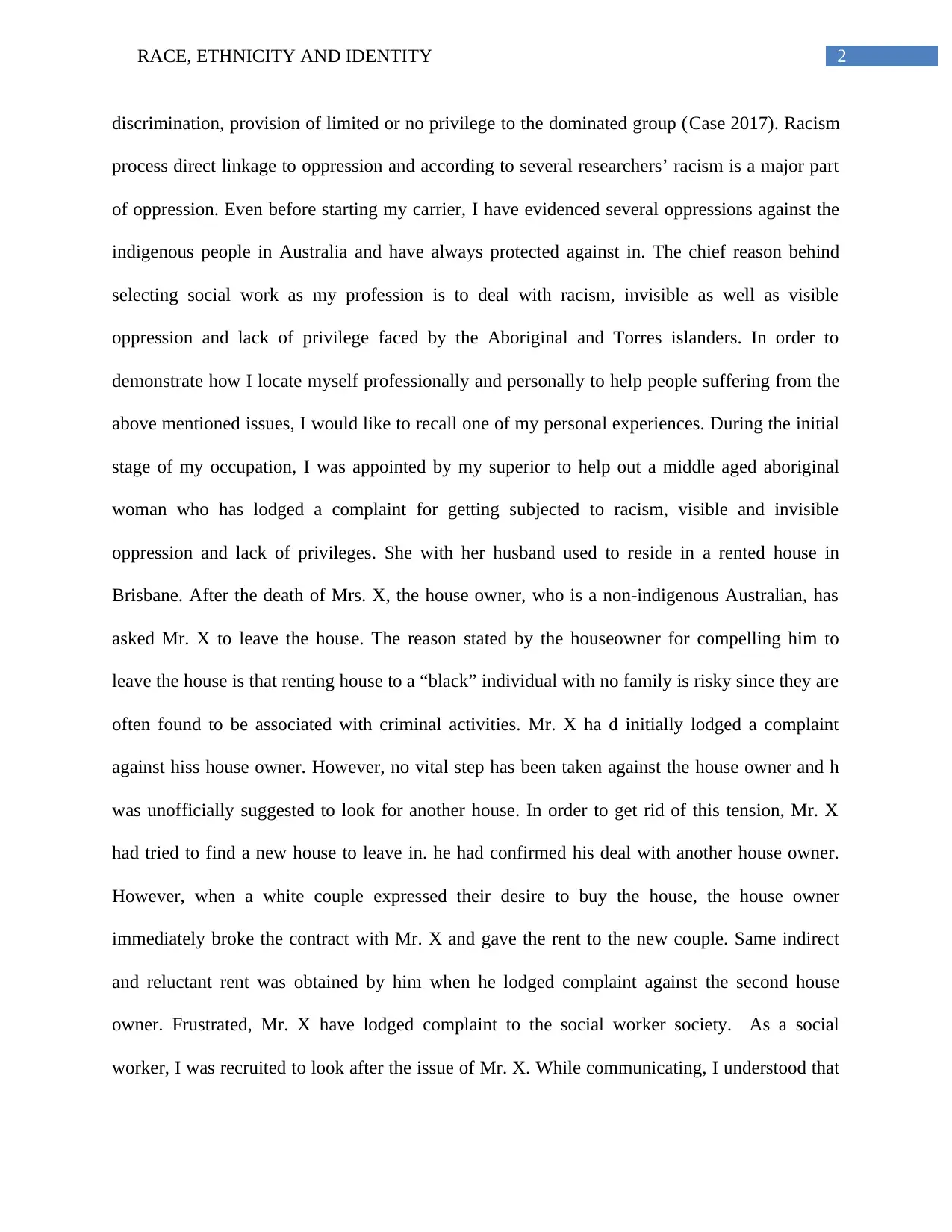
2RACE, ETHNICITY AND IDENTITY
discrimination, provision of limited or no privilege to the dominated group (Case 2017). Racism
process direct linkage to oppression and according to several researchers’ racism is a major part
of oppression. Even before starting my carrier, I have evidenced several oppressions against the
indigenous people in Australia and have always protected against in. The chief reason behind
selecting social work as my profession is to deal with racism, invisible as well as visible
oppression and lack of privilege faced by the Aboriginal and Torres islanders. In order to
demonstrate how I locate myself professionally and personally to help people suffering from the
above mentioned issues, I would like to recall one of my personal experiences. During the initial
stage of my occupation, I was appointed by my superior to help out a middle aged aboriginal
woman who has lodged a complaint for getting subjected to racism, visible and invisible
oppression and lack of privileges. She with her husband used to reside in a rented house in
Brisbane. After the death of Mrs. X, the house owner, who is a non-indigenous Australian, has
asked Mr. X to leave the house. The reason stated by the houseowner for compelling him to
leave the house is that renting house to a “black” individual with no family is risky since they are
often found to be associated with criminal activities. Mr. X ha d initially lodged a complaint
against hiss house owner. However, no vital step has been taken against the house owner and h
was unofficially suggested to look for another house. In order to get rid of this tension, Mr. X
had tried to find a new house to leave in. he had confirmed his deal with another house owner.
However, when a white couple expressed their desire to buy the house, the house owner
immediately broke the contract with Mr. X and gave the rent to the new couple. Same indirect
and reluctant rent was obtained by him when he lodged complaint against the second house
owner. Frustrated, Mr. X have lodged complaint to the social worker society. As a social
worker, I was recruited to look after the issue of Mr. X. While communicating, I understood that
discrimination, provision of limited or no privilege to the dominated group (Case 2017). Racism
process direct linkage to oppression and according to several researchers’ racism is a major part
of oppression. Even before starting my carrier, I have evidenced several oppressions against the
indigenous people in Australia and have always protected against in. The chief reason behind
selecting social work as my profession is to deal with racism, invisible as well as visible
oppression and lack of privilege faced by the Aboriginal and Torres islanders. In order to
demonstrate how I locate myself professionally and personally to help people suffering from the
above mentioned issues, I would like to recall one of my personal experiences. During the initial
stage of my occupation, I was appointed by my superior to help out a middle aged aboriginal
woman who has lodged a complaint for getting subjected to racism, visible and invisible
oppression and lack of privileges. She with her husband used to reside in a rented house in
Brisbane. After the death of Mrs. X, the house owner, who is a non-indigenous Australian, has
asked Mr. X to leave the house. The reason stated by the houseowner for compelling him to
leave the house is that renting house to a “black” individual with no family is risky since they are
often found to be associated with criminal activities. Mr. X ha d initially lodged a complaint
against hiss house owner. However, no vital step has been taken against the house owner and h
was unofficially suggested to look for another house. In order to get rid of this tension, Mr. X
had tried to find a new house to leave in. he had confirmed his deal with another house owner.
However, when a white couple expressed their desire to buy the house, the house owner
immediately broke the contract with Mr. X and gave the rent to the new couple. Same indirect
and reluctant rent was obtained by him when he lodged complaint against the second house
owner. Frustrated, Mr. X have lodged complaint to the social worker society. As a social
worker, I was recruited to look after the issue of Mr. X. While communicating, I understood that
⊘ This is a preview!⊘
Do you want full access?
Subscribe today to unlock all pages.

Trusted by 1+ million students worldwide
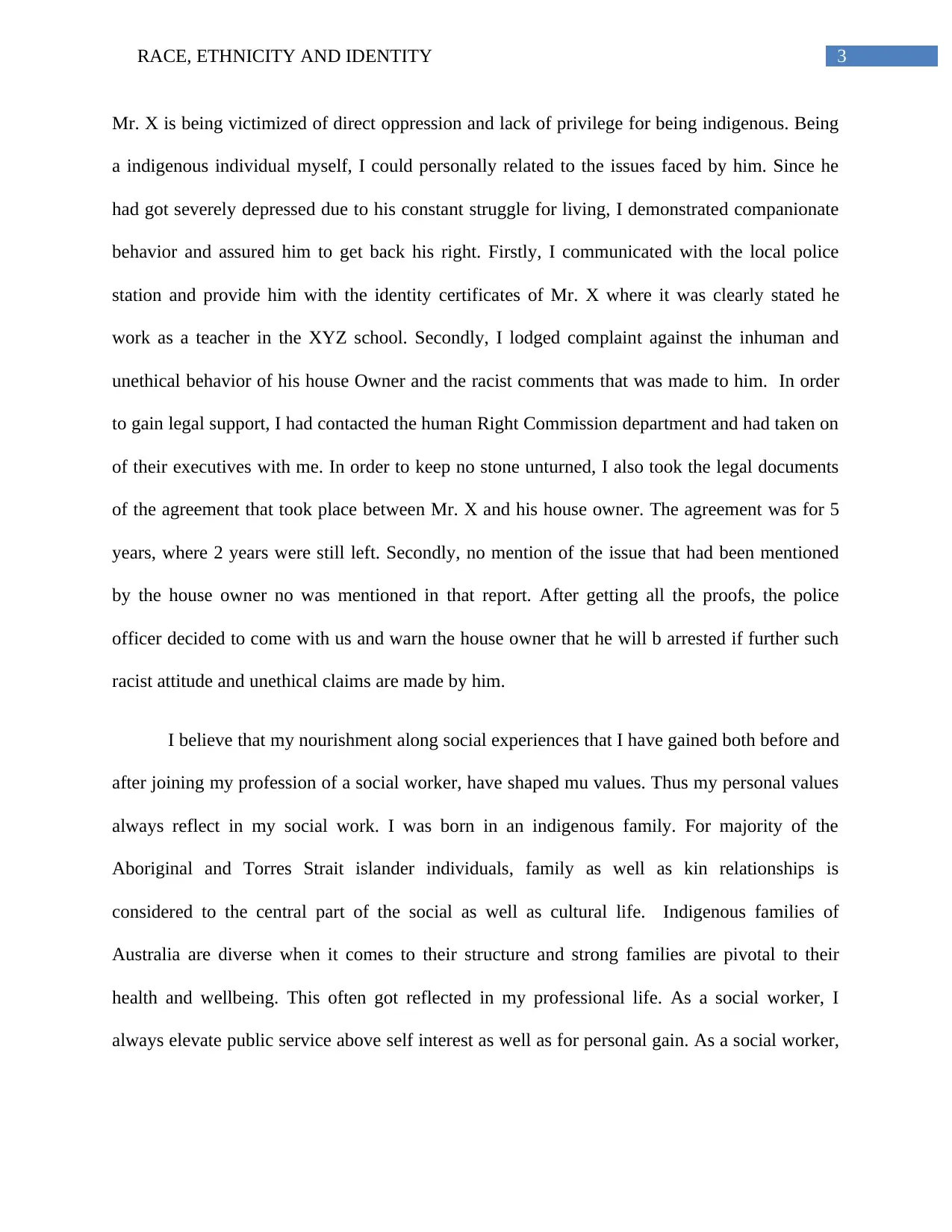
3RACE, ETHNICITY AND IDENTITY
Mr. X is being victimized of direct oppression and lack of privilege for being indigenous. Being
a indigenous individual myself, I could personally related to the issues faced by him. Since he
had got severely depressed due to his constant struggle for living, I demonstrated companionate
behavior and assured him to get back his right. Firstly, I communicated with the local police
station and provide him with the identity certificates of Mr. X where it was clearly stated he
work as a teacher in the XYZ school. Secondly, I lodged complaint against the inhuman and
unethical behavior of his house Owner and the racist comments that was made to him. In order
to gain legal support, I had contacted the human Right Commission department and had taken on
of their executives with me. In order to keep no stone unturned, I also took the legal documents
of the agreement that took place between Mr. X and his house owner. The agreement was for 5
years, where 2 years were still left. Secondly, no mention of the issue that had been mentioned
by the house owner no was mentioned in that report. After getting all the proofs, the police
officer decided to come with us and warn the house owner that he will b arrested if further such
racist attitude and unethical claims are made by him.
I believe that my nourishment along social experiences that I have gained both before and
after joining my profession of a social worker, have shaped mu values. Thus my personal values
always reflect in my social work. I was born in an indigenous family. For majority of the
Aboriginal and Torres Strait islander individuals, family as well as kin relationships is
considered to the central part of the social as well as cultural life. Indigenous families of
Australia are diverse when it comes to their structure and strong families are pivotal to their
health and wellbeing. This often got reflected in my professional life. As a social worker, I
always elevate public service above self interest as well as for personal gain. As a social worker,
Mr. X is being victimized of direct oppression and lack of privilege for being indigenous. Being
a indigenous individual myself, I could personally related to the issues faced by him. Since he
had got severely depressed due to his constant struggle for living, I demonstrated companionate
behavior and assured him to get back his right. Firstly, I communicated with the local police
station and provide him with the identity certificates of Mr. X where it was clearly stated he
work as a teacher in the XYZ school. Secondly, I lodged complaint against the inhuman and
unethical behavior of his house Owner and the racist comments that was made to him. In order
to gain legal support, I had contacted the human Right Commission department and had taken on
of their executives with me. In order to keep no stone unturned, I also took the legal documents
of the agreement that took place between Mr. X and his house owner. The agreement was for 5
years, where 2 years were still left. Secondly, no mention of the issue that had been mentioned
by the house owner no was mentioned in that report. After getting all the proofs, the police
officer decided to come with us and warn the house owner that he will b arrested if further such
racist attitude and unethical claims are made by him.
I believe that my nourishment along social experiences that I have gained both before and
after joining my profession of a social worker, have shaped mu values. Thus my personal values
always reflect in my social work. I was born in an indigenous family. For majority of the
Aboriginal and Torres Strait islander individuals, family as well as kin relationships is
considered to the central part of the social as well as cultural life. Indigenous families of
Australia are diverse when it comes to their structure and strong families are pivotal to their
health and wellbeing. This often got reflected in my professional life. As a social worker, I
always elevate public service above self interest as well as for personal gain. As a social worker,
Paraphrase This Document
Need a fresh take? Get an instant paraphrase of this document with our AI Paraphraser
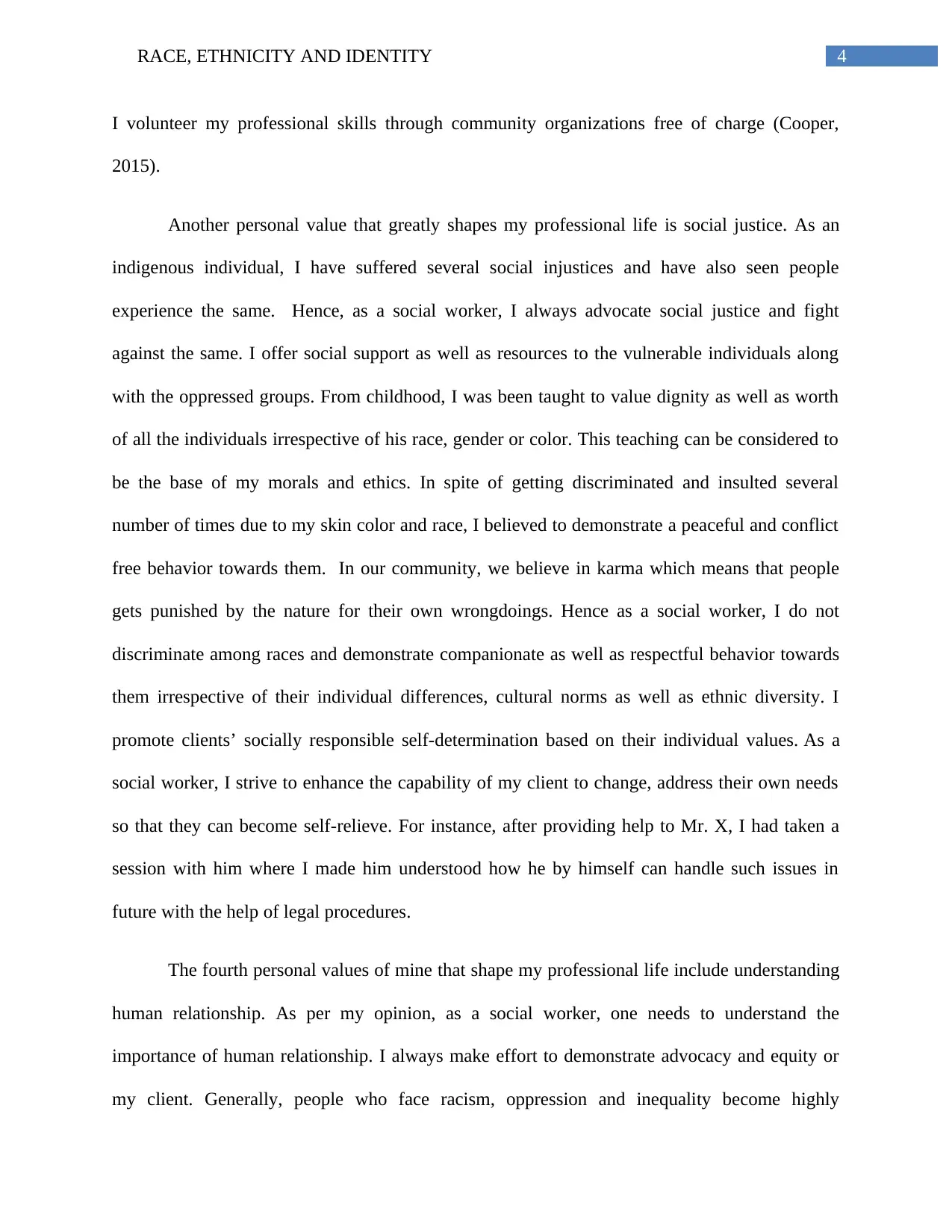
4RACE, ETHNICITY AND IDENTITY
I volunteer my professional skills through community organizations free of charge (Cooper,
2015).
Another personal value that greatly shapes my professional life is social justice. As an
indigenous individual, I have suffered several social injustices and have also seen people
experience the same. Hence, as a social worker, I always advocate social justice and fight
against the same. I offer social support as well as resources to the vulnerable individuals along
with the oppressed groups. From childhood, I was been taught to value dignity as well as worth
of all the individuals irrespective of his race, gender or color. This teaching can be considered to
be the base of my morals and ethics. In spite of getting discriminated and insulted several
number of times due to my skin color and race, I believed to demonstrate a peaceful and conflict
free behavior towards them. In our community, we believe in karma which means that people
gets punished by the nature for their own wrongdoings. Hence as a social worker, I do not
discriminate among races and demonstrate companionate as well as respectful behavior towards
them irrespective of their individual differences, cultural norms as well as ethnic diversity. I
promote clients’ socially responsible self-determination based on their individual values. As a
social worker, I strive to enhance the capability of my client to change, address their own needs
so that they can become self-relieve. For instance, after providing help to Mr. X, I had taken a
session with him where I made him understood how he by himself can handle such issues in
future with the help of legal procedures.
The fourth personal values of mine that shape my professional life include understanding
human relationship. As per my opinion, as a social worker, one needs to understand the
importance of human relationship. I always make effort to demonstrate advocacy and equity or
my client. Generally, people who face racism, oppression and inequality become highly
I volunteer my professional skills through community organizations free of charge (Cooper,
2015).
Another personal value that greatly shapes my professional life is social justice. As an
indigenous individual, I have suffered several social injustices and have also seen people
experience the same. Hence, as a social worker, I always advocate social justice and fight
against the same. I offer social support as well as resources to the vulnerable individuals along
with the oppressed groups. From childhood, I was been taught to value dignity as well as worth
of all the individuals irrespective of his race, gender or color. This teaching can be considered to
be the base of my morals and ethics. In spite of getting discriminated and insulted several
number of times due to my skin color and race, I believed to demonstrate a peaceful and conflict
free behavior towards them. In our community, we believe in karma which means that people
gets punished by the nature for their own wrongdoings. Hence as a social worker, I do not
discriminate among races and demonstrate companionate as well as respectful behavior towards
them irrespective of their individual differences, cultural norms as well as ethnic diversity. I
promote clients’ socially responsible self-determination based on their individual values. As a
social worker, I strive to enhance the capability of my client to change, address their own needs
so that they can become self-relieve. For instance, after providing help to Mr. X, I had taken a
session with him where I made him understood how he by himself can handle such issues in
future with the help of legal procedures.
The fourth personal values of mine that shape my professional life include understanding
human relationship. As per my opinion, as a social worker, one needs to understand the
importance of human relationship. I always make effort to demonstrate advocacy and equity or
my client. Generally, people who face racism, oppression and inequality become highly
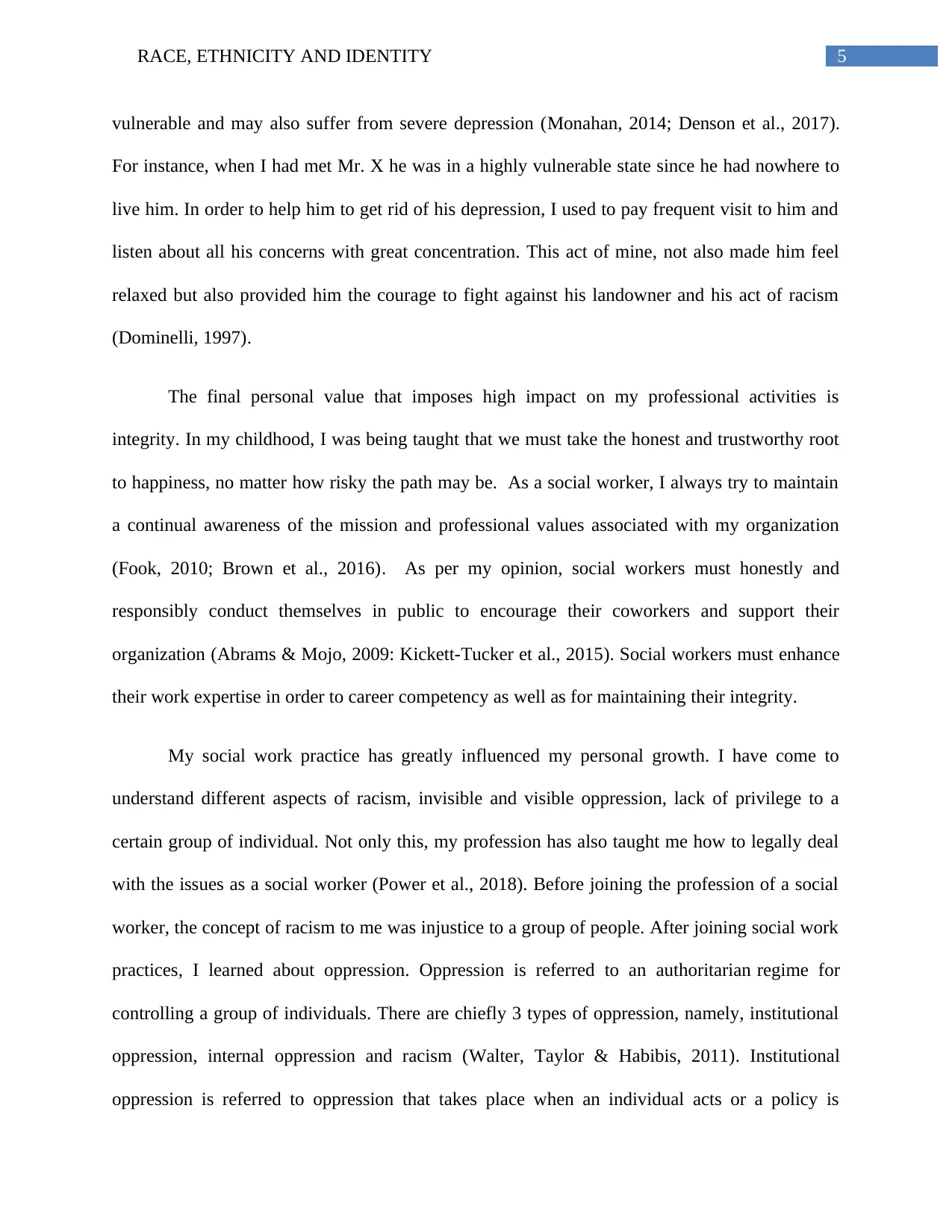
5RACE, ETHNICITY AND IDENTITY
vulnerable and may also suffer from severe depression (Monahan, 2014; Denson et al., 2017).
For instance, when I had met Mr. X he was in a highly vulnerable state since he had nowhere to
live him. In order to help him to get rid of his depression, I used to pay frequent visit to him and
listen about all his concerns with great concentration. This act of mine, not also made him feel
relaxed but also provided him the courage to fight against his landowner and his act of racism
(Dominelli, 1997).
The final personal value that imposes high impact on my professional activities is
integrity. In my childhood, I was being taught that we must take the honest and trustworthy root
to happiness, no matter how risky the path may be. As a social worker, I always try to maintain
a continual awareness of the mission and professional values associated with my organization
(Fook, 2010; Brown et al., 2016). As per my opinion, social workers must honestly and
responsibly conduct themselves in public to encourage their coworkers and support their
organization (Abrams & Mojo, 2009: Kickett-Tucker et al., 2015). Social workers must enhance
their work expertise in order to career competency as well as for maintaining their integrity.
My social work practice has greatly influenced my personal growth. I have come to
understand different aspects of racism, invisible and visible oppression, lack of privilege to a
certain group of individual. Not only this, my profession has also taught me how to legally deal
with the issues as a social worker (Power et al., 2018). Before joining the profession of a social
worker, the concept of racism to me was injustice to a group of people. After joining social work
practices, I learned about oppression. Oppression is referred to an authoritarian regime for
controlling a group of individuals. There are chiefly 3 types of oppression, namely, institutional
oppression, internal oppression and racism (Walter, Taylor & Habibis, 2011). Institutional
oppression is referred to oppression that takes place when an individual acts or a policy is
vulnerable and may also suffer from severe depression (Monahan, 2014; Denson et al., 2017).
For instance, when I had met Mr. X he was in a highly vulnerable state since he had nowhere to
live him. In order to help him to get rid of his depression, I used to pay frequent visit to him and
listen about all his concerns with great concentration. This act of mine, not also made him feel
relaxed but also provided him the courage to fight against his landowner and his act of racism
(Dominelli, 1997).
The final personal value that imposes high impact on my professional activities is
integrity. In my childhood, I was being taught that we must take the honest and trustworthy root
to happiness, no matter how risky the path may be. As a social worker, I always try to maintain
a continual awareness of the mission and professional values associated with my organization
(Fook, 2010; Brown et al., 2016). As per my opinion, social workers must honestly and
responsibly conduct themselves in public to encourage their coworkers and support their
organization (Abrams & Mojo, 2009: Kickett-Tucker et al., 2015). Social workers must enhance
their work expertise in order to career competency as well as for maintaining their integrity.
My social work practice has greatly influenced my personal growth. I have come to
understand different aspects of racism, invisible and visible oppression, lack of privilege to a
certain group of individual. Not only this, my profession has also taught me how to legally deal
with the issues as a social worker (Power et al., 2018). Before joining the profession of a social
worker, the concept of racism to me was injustice to a group of people. After joining social work
practices, I learned about oppression. Oppression is referred to an authoritarian regime for
controlling a group of individuals. There are chiefly 3 types of oppression, namely, institutional
oppression, internal oppression and racism (Walter, Taylor & Habibis, 2011). Institutional
oppression is referred to oppression that takes place when an individual acts or a policy is
⊘ This is a preview!⊘
Do you want full access?
Subscribe today to unlock all pages.

Trusted by 1+ million students worldwide
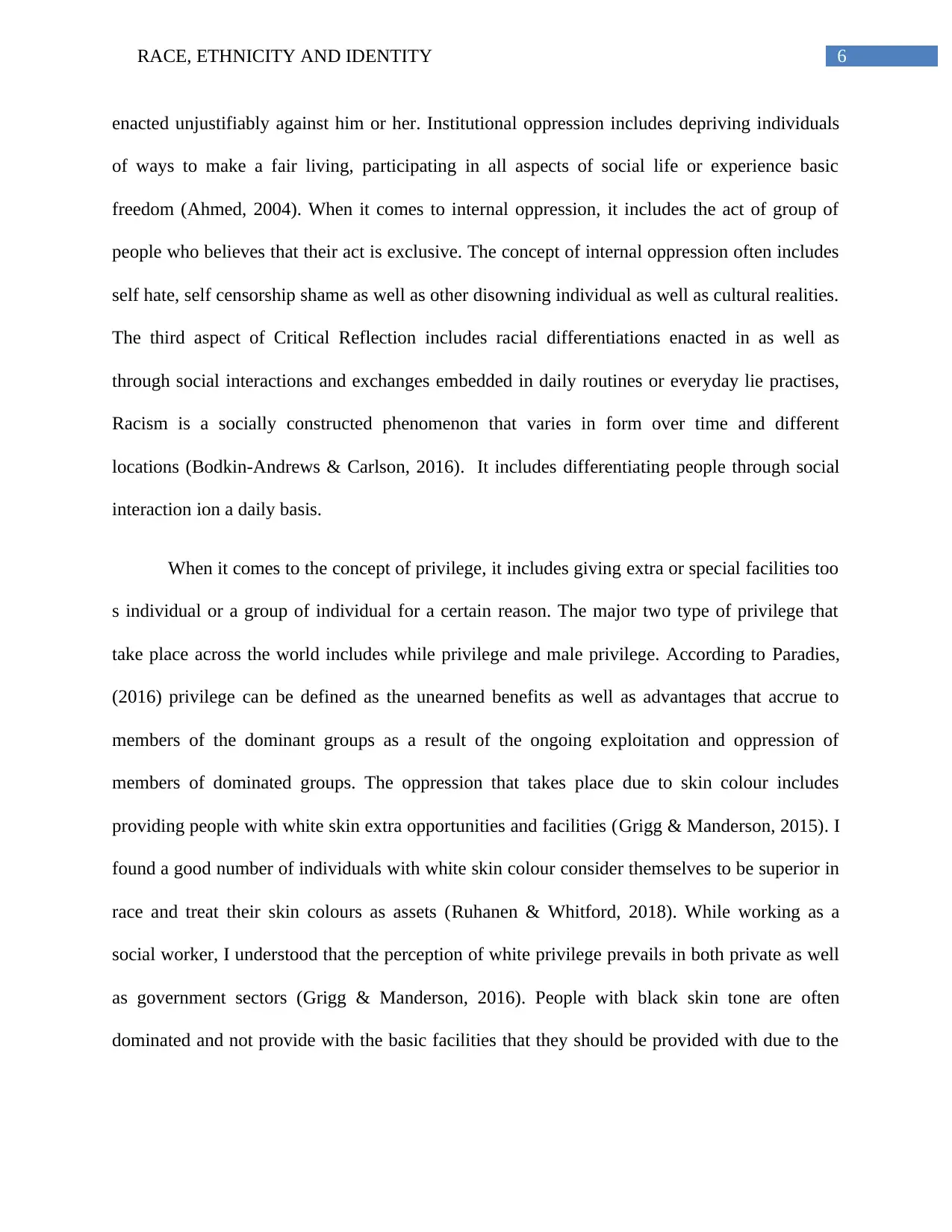
6RACE, ETHNICITY AND IDENTITY
enacted unjustifiably against him or her. Institutional oppression includes depriving individuals
of ways to make a fair living, participating in all aspects of social life or experience basic
freedom (Ahmed, 2004). When it comes to internal oppression, it includes the act of group of
people who believes that their act is exclusive. The concept of internal oppression often includes
self hate, self censorship shame as well as other disowning individual as well as cultural realities.
The third aspect of Critical Reflection includes racial differentiations enacted in as well as
through social interactions and exchanges embedded in daily routines or everyday lie practises,
Racism is a socially constructed phenomenon that varies in form over time and different
locations (Bodkin-Andrews & Carlson, 2016). It includes differentiating people through social
interaction ion a daily basis.
When it comes to the concept of privilege, it includes giving extra or special facilities too
s individual or a group of individual for a certain reason. The major two type of privilege that
take place across the world includes while privilege and male privilege. According to Paradies,
(2016) privilege can be defined as the unearned benefits as well as advantages that accrue to
members of the dominant groups as a result of the ongoing exploitation and oppression of
members of dominated groups. The oppression that takes place due to skin colour includes
providing people with white skin extra opportunities and facilities (Grigg & Manderson, 2015). I
found a good number of individuals with white skin colour consider themselves to be superior in
race and treat their skin colours as assets (Ruhanen & Whitford, 2018). While working as a
social worker, I understood that the perception of white privilege prevails in both private as well
as government sectors (Grigg & Manderson, 2016). People with black skin tone are often
dominated and not provide with the basic facilities that they should be provided with due to the
enacted unjustifiably against him or her. Institutional oppression includes depriving individuals
of ways to make a fair living, participating in all aspects of social life or experience basic
freedom (Ahmed, 2004). When it comes to internal oppression, it includes the act of group of
people who believes that their act is exclusive. The concept of internal oppression often includes
self hate, self censorship shame as well as other disowning individual as well as cultural realities.
The third aspect of Critical Reflection includes racial differentiations enacted in as well as
through social interactions and exchanges embedded in daily routines or everyday lie practises,
Racism is a socially constructed phenomenon that varies in form over time and different
locations (Bodkin-Andrews & Carlson, 2016). It includes differentiating people through social
interaction ion a daily basis.
When it comes to the concept of privilege, it includes giving extra or special facilities too
s individual or a group of individual for a certain reason. The major two type of privilege that
take place across the world includes while privilege and male privilege. According to Paradies,
(2016) privilege can be defined as the unearned benefits as well as advantages that accrue to
members of the dominant groups as a result of the ongoing exploitation and oppression of
members of dominated groups. The oppression that takes place due to skin colour includes
providing people with white skin extra opportunities and facilities (Grigg & Manderson, 2015). I
found a good number of individuals with white skin colour consider themselves to be superior in
race and treat their skin colours as assets (Ruhanen & Whitford, 2018). While working as a
social worker, I understood that the perception of white privilege prevails in both private as well
as government sectors (Grigg & Manderson, 2016). People with black skin tone are often
dominated and not provide with the basic facilities that they should be provided with due to the
Paraphrase This Document
Need a fresh take? Get an instant paraphrase of this document with our AI Paraphraser
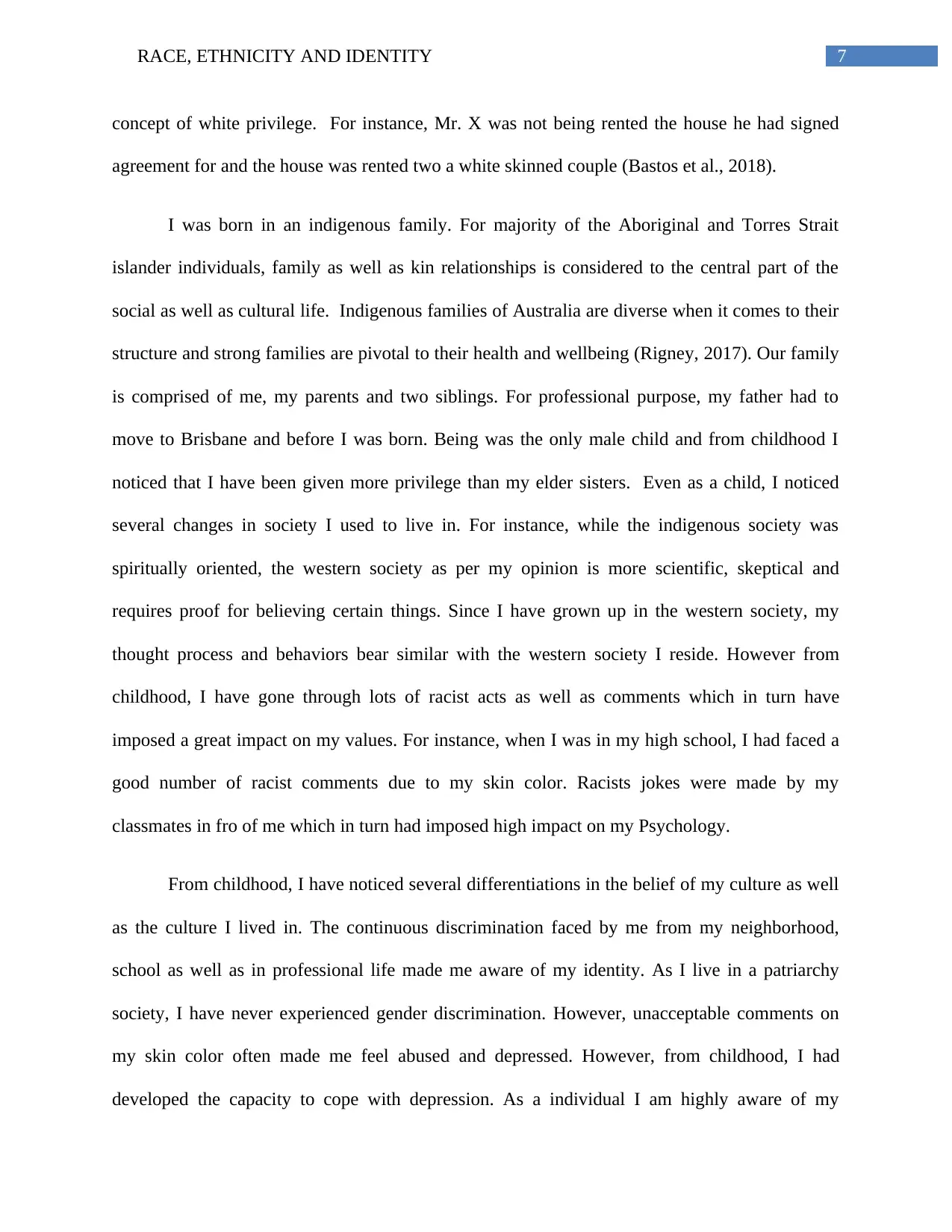
7RACE, ETHNICITY AND IDENTITY
concept of white privilege. For instance, Mr. X was not being rented the house he had signed
agreement for and the house was rented two a white skinned couple (Bastos et al., 2018).
I was born in an indigenous family. For majority of the Aboriginal and Torres Strait
islander individuals, family as well as kin relationships is considered to the central part of the
social as well as cultural life. Indigenous families of Australia are diverse when it comes to their
structure and strong families are pivotal to their health and wellbeing (Rigney, 2017). Our family
is comprised of me, my parents and two siblings. For professional purpose, my father had to
move to Brisbane and before I was born. Being was the only male child and from childhood I
noticed that I have been given more privilege than my elder sisters. Even as a child, I noticed
several changes in society I used to live in. For instance, while the indigenous society was
spiritually oriented, the western society as per my opinion is more scientific, skeptical and
requires proof for believing certain things. Since I have grown up in the western society, my
thought process and behaviors bear similar with the western society I reside. However from
childhood, I have gone through lots of racist acts as well as comments which in turn have
imposed a great impact on my values. For instance, when I was in my high school, I had faced a
good number of racist comments due to my skin color. Racists jokes were made by my
classmates in fro of me which in turn had imposed high impact on my Psychology.
From childhood, I have noticed several differentiations in the belief of my culture as well
as the culture I lived in. The continuous discrimination faced by me from my neighborhood,
school as well as in professional life made me aware of my identity. As I live in a patriarchy
society, I have never experienced gender discrimination. However, unacceptable comments on
my skin color often made me feel abused and depressed. However, from childhood, I had
developed the capacity to cope with depression. As a individual I am highly aware of my
concept of white privilege. For instance, Mr. X was not being rented the house he had signed
agreement for and the house was rented two a white skinned couple (Bastos et al., 2018).
I was born in an indigenous family. For majority of the Aboriginal and Torres Strait
islander individuals, family as well as kin relationships is considered to the central part of the
social as well as cultural life. Indigenous families of Australia are diverse when it comes to their
structure and strong families are pivotal to their health and wellbeing (Rigney, 2017). Our family
is comprised of me, my parents and two siblings. For professional purpose, my father had to
move to Brisbane and before I was born. Being was the only male child and from childhood I
noticed that I have been given more privilege than my elder sisters. Even as a child, I noticed
several changes in society I used to live in. For instance, while the indigenous society was
spiritually oriented, the western society as per my opinion is more scientific, skeptical and
requires proof for believing certain things. Since I have grown up in the western society, my
thought process and behaviors bear similar with the western society I reside. However from
childhood, I have gone through lots of racist acts as well as comments which in turn have
imposed a great impact on my values. For instance, when I was in my high school, I had faced a
good number of racist comments due to my skin color. Racists jokes were made by my
classmates in fro of me which in turn had imposed high impact on my Psychology.
From childhood, I have noticed several differentiations in the belief of my culture as well
as the culture I lived in. The continuous discrimination faced by me from my neighborhood,
school as well as in professional life made me aware of my identity. As I live in a patriarchy
society, I have never experienced gender discrimination. However, unacceptable comments on
my skin color often made me feel abused and depressed. However, from childhood, I had
developed the capacity to cope with depression. As a individual I am highly aware of my
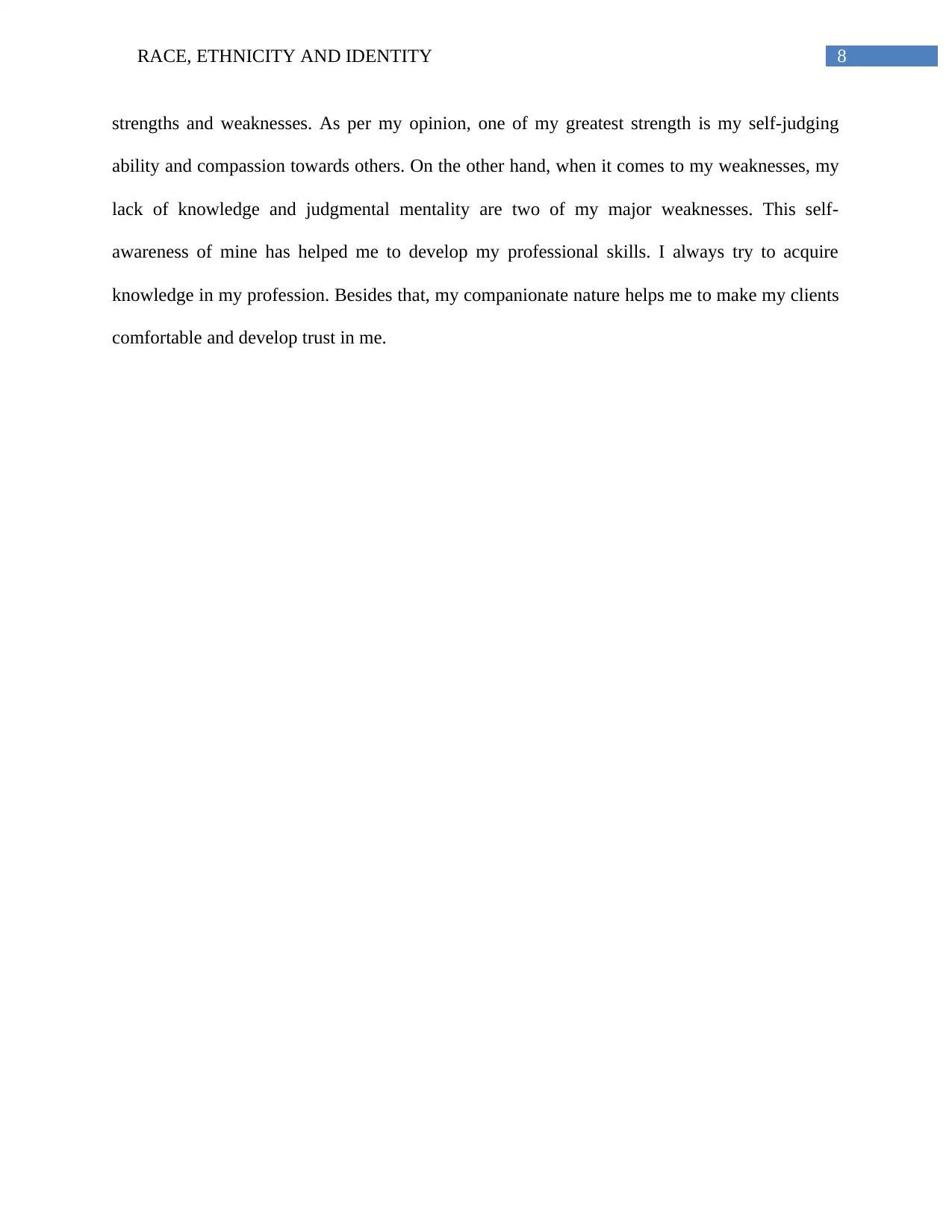
8RACE, ETHNICITY AND IDENTITY
strengths and weaknesses. As per my opinion, one of my greatest strength is my self-judging
ability and compassion towards others. On the other hand, when it comes to my weaknesses, my
lack of knowledge and judgmental mentality are two of my major weaknesses. This self-
awareness of mine has helped me to develop my professional skills. I always try to acquire
knowledge in my profession. Besides that, my companionate nature helps me to make my clients
comfortable and develop trust in me.
strengths and weaknesses. As per my opinion, one of my greatest strength is my self-judging
ability and compassion towards others. On the other hand, when it comes to my weaknesses, my
lack of knowledge and judgmental mentality are two of my major weaknesses. This self-
awareness of mine has helped me to develop my professional skills. I always try to acquire
knowledge in my profession. Besides that, my companionate nature helps me to make my clients
comfortable and develop trust in me.
⊘ This is a preview!⊘
Do you want full access?
Subscribe today to unlock all pages.

Trusted by 1+ million students worldwide
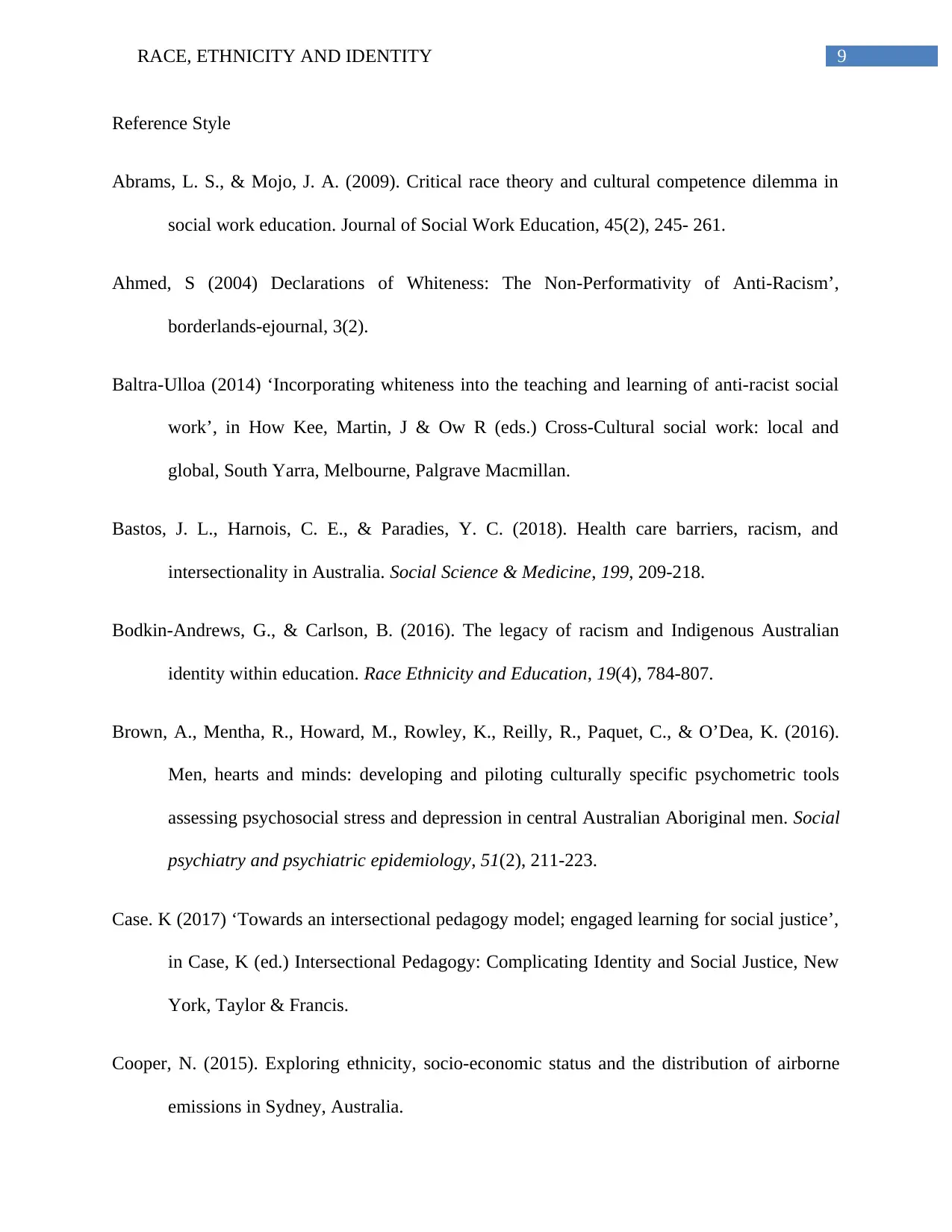
9RACE, ETHNICITY AND IDENTITY
Reference Style
Abrams, L. S., & Mojo, J. A. (2009). Critical race theory and cultural competence dilemma in
social work education. Journal of Social Work Education, 45(2), 245- 261.
Ahmed, S (2004) Declarations of Whiteness: The Non-Performativity of Anti-Racism’,
borderlands-ejournal, 3(2).
Baltra-Ulloa (2014) ‘Incorporating whiteness into the teaching and learning of anti-racist social
work’, in How Kee, Martin, J & Ow R (eds.) Cross-Cultural social work: local and
global, South Yarra, Melbourne, Palgrave Macmillan.
Bastos, J. L., Harnois, C. E., & Paradies, Y. C. (2018). Health care barriers, racism, and
intersectionality in Australia. Social Science & Medicine, 199, 209-218.
Bodkin-Andrews, G., & Carlson, B. (2016). The legacy of racism and Indigenous Australian
identity within education. Race Ethnicity and Education, 19(4), 784-807.
Brown, A., Mentha, R., Howard, M., Rowley, K., Reilly, R., Paquet, C., & O’Dea, K. (2016).
Men, hearts and minds: developing and piloting culturally specific psychometric tools
assessing psychosocial stress and depression in central Australian Aboriginal men. Social
psychiatry and psychiatric epidemiology, 51(2), 211-223.
Case. K (2017) ‘Towards an intersectional pedagogy model; engaged learning for social justice’,
in Case, K (ed.) Intersectional Pedagogy: Complicating Identity and Social Justice, New
York, Taylor & Francis.
Cooper, N. (2015). Exploring ethnicity, socio-economic status and the distribution of airborne
emissions in Sydney, Australia.
Reference Style
Abrams, L. S., & Mojo, J. A. (2009). Critical race theory and cultural competence dilemma in
social work education. Journal of Social Work Education, 45(2), 245- 261.
Ahmed, S (2004) Declarations of Whiteness: The Non-Performativity of Anti-Racism’,
borderlands-ejournal, 3(2).
Baltra-Ulloa (2014) ‘Incorporating whiteness into the teaching and learning of anti-racist social
work’, in How Kee, Martin, J & Ow R (eds.) Cross-Cultural social work: local and
global, South Yarra, Melbourne, Palgrave Macmillan.
Bastos, J. L., Harnois, C. E., & Paradies, Y. C. (2018). Health care barriers, racism, and
intersectionality in Australia. Social Science & Medicine, 199, 209-218.
Bodkin-Andrews, G., & Carlson, B. (2016). The legacy of racism and Indigenous Australian
identity within education. Race Ethnicity and Education, 19(4), 784-807.
Brown, A., Mentha, R., Howard, M., Rowley, K., Reilly, R., Paquet, C., & O’Dea, K. (2016).
Men, hearts and minds: developing and piloting culturally specific psychometric tools
assessing psychosocial stress and depression in central Australian Aboriginal men. Social
psychiatry and psychiatric epidemiology, 51(2), 211-223.
Case. K (2017) ‘Towards an intersectional pedagogy model; engaged learning for social justice’,
in Case, K (ed.) Intersectional Pedagogy: Complicating Identity and Social Justice, New
York, Taylor & Francis.
Cooper, N. (2015). Exploring ethnicity, socio-economic status and the distribution of airborne
emissions in Sydney, Australia.
Paraphrase This Document
Need a fresh take? Get an instant paraphrase of this document with our AI Paraphraser
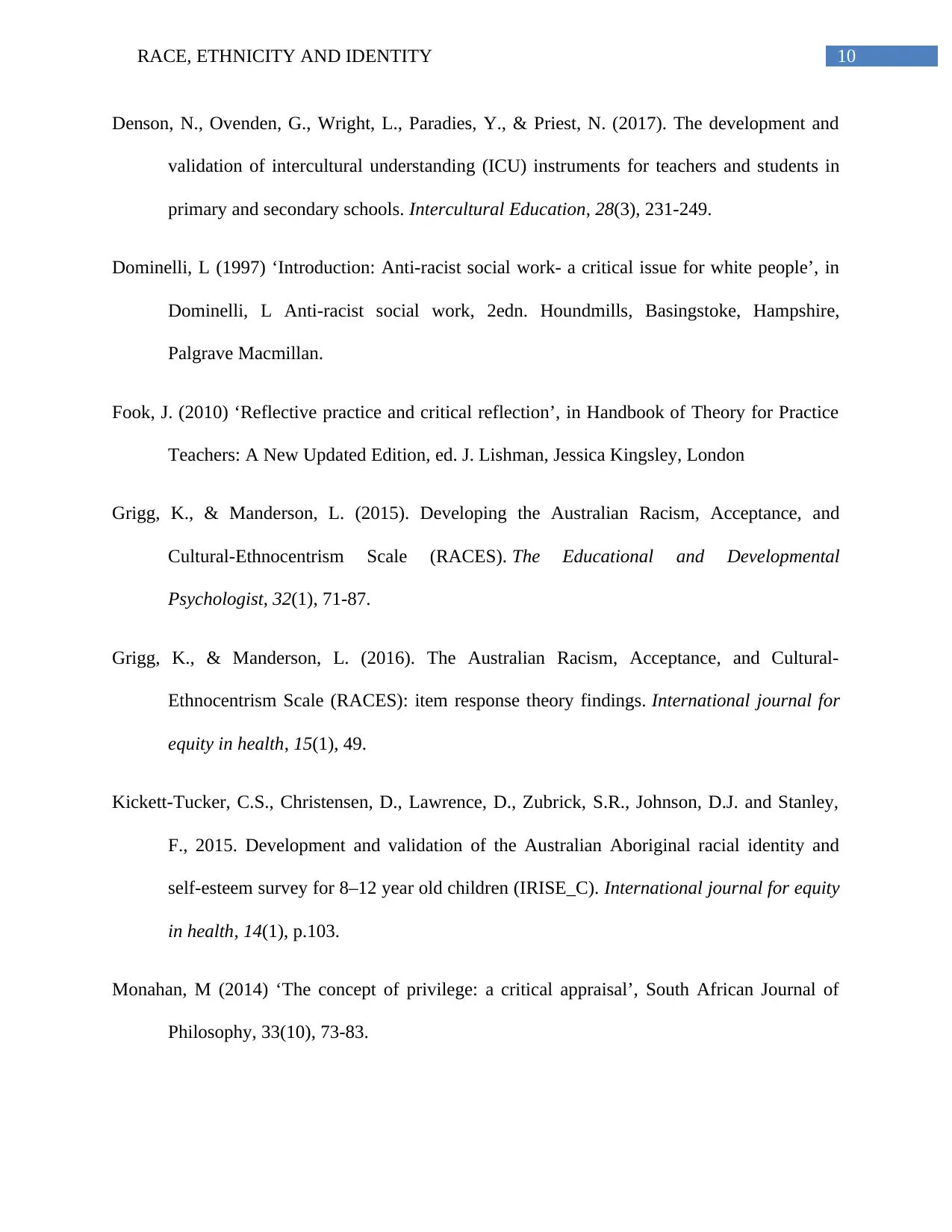
10RACE, ETHNICITY AND IDENTITY
Denson, N., Ovenden, G., Wright, L., Paradies, Y., & Priest, N. (2017). The development and
validation of intercultural understanding (ICU) instruments for teachers and students in
primary and secondary schools. Intercultural Education, 28(3), 231-249.
Dominelli, L (1997) ‘Introduction: Anti-racist social work- a critical issue for white people’, in
Dominelli, L Anti-racist social work, 2edn. Houndmills, Basingstoke, Hampshire,
Palgrave Macmillan.
Fook, J. (2010) ‘Reflective practice and critical reflection’, in Handbook of Theory for Practice
Teachers: A New Updated Edition, ed. J. Lishman, Jessica Kingsley, London
Grigg, K., & Manderson, L. (2015). Developing the Australian Racism, Acceptance, and
Cultural-Ethnocentrism Scale (RACES). The Educational and Developmental
Psychologist, 32(1), 71-87.
Grigg, K., & Manderson, L. (2016). The Australian Racism, Acceptance, and Cultural-
Ethnocentrism Scale (RACES): item response theory findings. International journal for
equity in health, 15(1), 49.
Kickett-Tucker, C.S., Christensen, D., Lawrence, D., Zubrick, S.R., Johnson, D.J. and Stanley,
F., 2015. Development and validation of the Australian Aboriginal racial identity and
self-esteem survey for 8–12 year old children (IRISE_C). International journal for equity
in health, 14(1), p.103.
Monahan, M (2014) ‘The concept of privilege: a critical appraisal’, South African Journal of
Philosophy, 33(10), 73-83.
Denson, N., Ovenden, G., Wright, L., Paradies, Y., & Priest, N. (2017). The development and
validation of intercultural understanding (ICU) instruments for teachers and students in
primary and secondary schools. Intercultural Education, 28(3), 231-249.
Dominelli, L (1997) ‘Introduction: Anti-racist social work- a critical issue for white people’, in
Dominelli, L Anti-racist social work, 2edn. Houndmills, Basingstoke, Hampshire,
Palgrave Macmillan.
Fook, J. (2010) ‘Reflective practice and critical reflection’, in Handbook of Theory for Practice
Teachers: A New Updated Edition, ed. J. Lishman, Jessica Kingsley, London
Grigg, K., & Manderson, L. (2015). Developing the Australian Racism, Acceptance, and
Cultural-Ethnocentrism Scale (RACES). The Educational and Developmental
Psychologist, 32(1), 71-87.
Grigg, K., & Manderson, L. (2016). The Australian Racism, Acceptance, and Cultural-
Ethnocentrism Scale (RACES): item response theory findings. International journal for
equity in health, 15(1), 49.
Kickett-Tucker, C.S., Christensen, D., Lawrence, D., Zubrick, S.R., Johnson, D.J. and Stanley,
F., 2015. Development and validation of the Australian Aboriginal racial identity and
self-esteem survey for 8–12 year old children (IRISE_C). International journal for equity
in health, 14(1), p.103.
Monahan, M (2014) ‘The concept of privilege: a critical appraisal’, South African Journal of
Philosophy, 33(10), 73-83.
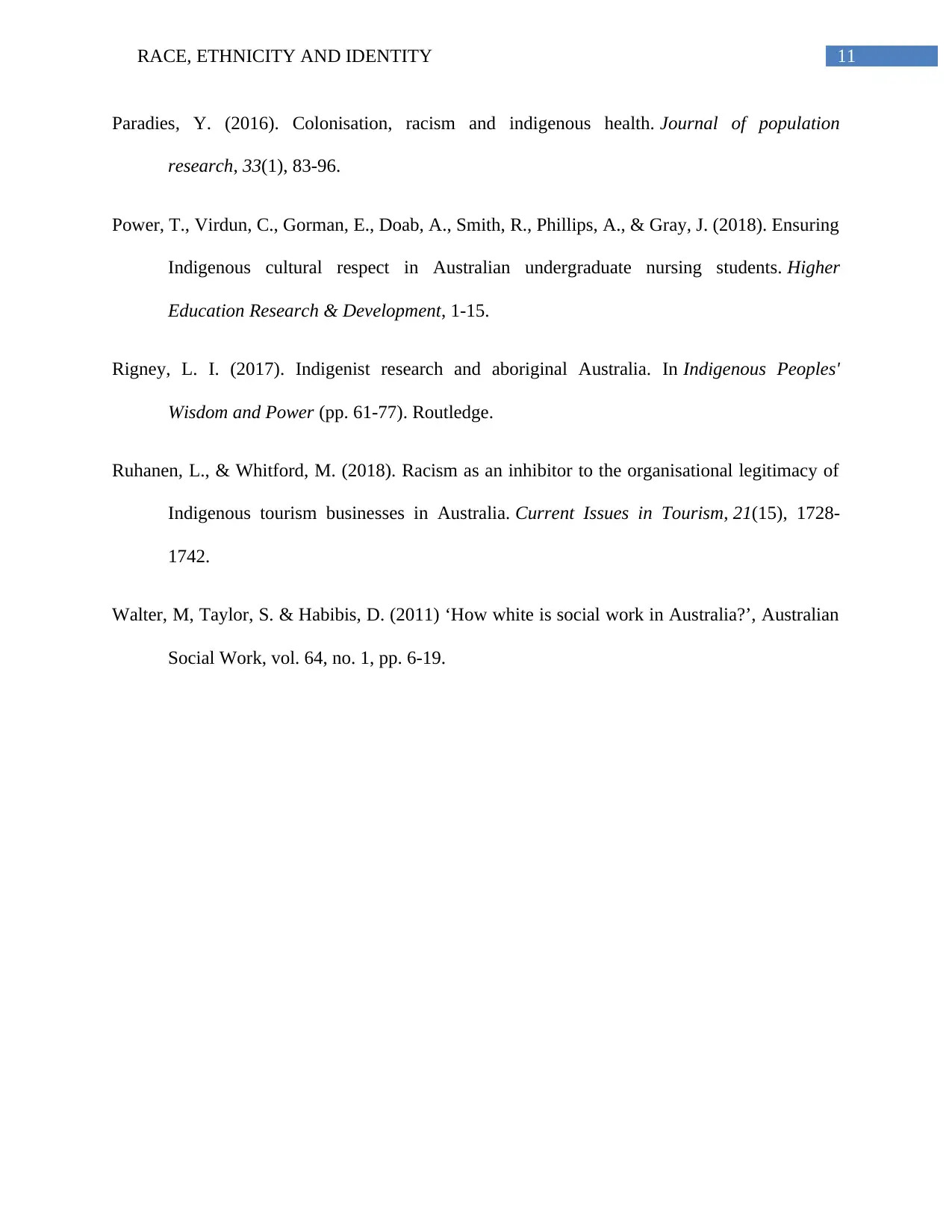
11RACE, ETHNICITY AND IDENTITY
Paradies, Y. (2016). Colonisation, racism and indigenous health. Journal of population
research, 33(1), 83-96.
Power, T., Virdun, C., Gorman, E., Doab, A., Smith, R., Phillips, A., & Gray, J. (2018). Ensuring
Indigenous cultural respect in Australian undergraduate nursing students. Higher
Education Research & Development, 1-15.
Rigney, L. I. (2017). Indigenist research and aboriginal Australia. In Indigenous Peoples'
Wisdom and Power (pp. 61-77). Routledge.
Ruhanen, L., & Whitford, M. (2018). Racism as an inhibitor to the organisational legitimacy of
Indigenous tourism businesses in Australia. Current Issues in Tourism, 21(15), 1728-
1742.
Walter, M, Taylor, S. & Habibis, D. (2011) ‘How white is social work in Australia?’, Australian
Social Work, vol. 64, no. 1, pp. 6-19.
Paradies, Y. (2016). Colonisation, racism and indigenous health. Journal of population
research, 33(1), 83-96.
Power, T., Virdun, C., Gorman, E., Doab, A., Smith, R., Phillips, A., & Gray, J. (2018). Ensuring
Indigenous cultural respect in Australian undergraduate nursing students. Higher
Education Research & Development, 1-15.
Rigney, L. I. (2017). Indigenist research and aboriginal Australia. In Indigenous Peoples'
Wisdom and Power (pp. 61-77). Routledge.
Ruhanen, L., & Whitford, M. (2018). Racism as an inhibitor to the organisational legitimacy of
Indigenous tourism businesses in Australia. Current Issues in Tourism, 21(15), 1728-
1742.
Walter, M, Taylor, S. & Habibis, D. (2011) ‘How white is social work in Australia?’, Australian
Social Work, vol. 64, no. 1, pp. 6-19.
⊘ This is a preview!⊘
Do you want full access?
Subscribe today to unlock all pages.

Trusted by 1+ million students worldwide
1 out of 12
Related Documents
Your All-in-One AI-Powered Toolkit for Academic Success.
+13062052269
info@desklib.com
Available 24*7 on WhatsApp / Email
![[object Object]](/_next/static/media/star-bottom.7253800d.svg)
Unlock your academic potential
Copyright © 2020–2026 A2Z Services. All Rights Reserved. Developed and managed by ZUCOL.





